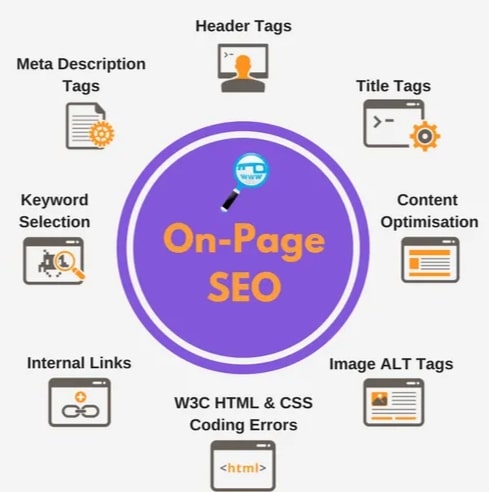In today’s digital age, search engine optimization (SEO) has become an essential aspect of any successful online business. To ensure that your website is performing at its best and reaching its full potential, it is crucial to conduct regular SEO audits. These audits provide valuable insights and recommendations on how to optimize various elements of your website.
Let’s explore the importance of SEO audits and the different types available.
Importance of SEO Audits
- Identifying Opportunities for Improvement: An SEO audit allows you to analyze your website’s performance and identify areas that could benefit from optimization. By examining your site’s strengths and weaknesses, you can develop a comprehensive strategy to enhance its overall visibility and organic traffic.
- Staying Ahead of Competitors: Regular SEO audits enable you to understand how your competitors are performing in the online landscape. By evaluating their strategies, keywords, and backlink profiles, you can gain valuable insights and adjust your own tactics accordingly.
- Enhancing User Experience: User experience is a critical factor in SEO. By conducting an audit, you can identify any issues that may impact your site’s usability, such as slow page loading times, broken links, or poor mobile responsiveness. Improving user experience will not only please your visitors but also boost your search engine rankings.
- Keeping Up with Algorithm Changes: Search engine algorithms are constantly evolving, and what worked yesterday may not work tomorrow. An SEO audit helps you remain up-to-date with the latest trends and algorithm changes, ensuring that your website stays visible and relevant in search engine results pages (SERPs).
Types of SEO Audit
There are various types of SEO audits, each focusing on different aspects of your website’s optimization. Let’s explore the most common ones:
Technical SEO Audit

A technical SEO audit involves analyzing various technical aspects of a website to ensure that it is optimized for search engines and can be crawled and indexed effectively.
Key areas to consider during a technical SEO audit include:
- Website Speed: Evaluate the loading speed of your web pages using tools like Google PageSpeed Insights. Aim for a fast loading time to provide an excellent user experience and improve search engine rankings.
- Crawlability: Ensure that search engines can easily crawl and index your website by checking for any crawl errors or blocked pages. To find and address these problems, use tools like Google Search Console.
- URL Structure: Optimize your website’s URL structure by making it descriptive and user-friendly. Avoid using lengthy URLs or excessive parameters, as they can confuse both users and search engines.
Content Audit


A content audit evaluates the quality, relevance, and performance of your website’s content. Analyzing elements like keyword usage, text length, readability, and engagement metrics is part of the process. By conducting a thorough content audit, you can identify opportunities for improvement and optimize your content strategy.
Key areas to consider during a content audit include:
- Keyword Analysis: Analyze your target keywords and ensure they are strategically incorporated into your content. Look for keyword cannibalization, where multiple pages on your site target the same keyword, and make necessary adjustments.
- Content Relevance: Assess the relevance of your content to your target audience and industry. Remove outdated or irrelevant content and focus on creating fresh and informative pieces that align with your users’ search intent.
- Readability: Ensure that your content is easy to read and understand by using appropriate headings, subheadings, and bullet points. Consider the formatting, sentence structure, and paragraph length to enhance readability.
On-site SEO Audit


An on-site SEO audit delves into optimizing elements directly on your website, including internal linking, meta titles and descriptions, header tags, and image alt tags. By addressing on-site SEO factors, you can improve your site’s keyword targeting and overall visibility in search results.
Key areas to consider during an on-site SEO audit include:
- Meta Tags: Assess the optimization of your meta titles and descriptions for each page. Ensure they are unique, concise, and contain relevant keywords to attract organic traffic.
- Header Tags: Optimize your header tags (H1, H2, H3) by incorporating relevant keywords and organizing your content hierarchy. This helps search engines understand the structure and relevance of your content.
- Internal Linking: Review your internal linking structure to ensure that it’s logical, easy to navigate, and supports the flow of link equity throughout your website. Internal links help search engines discover and index your content efficiently.
Off-site SEO Audit


An off-site SEO audit focuses on external elements including your website’s backlink profile, social media presence, and online reputation that have an impact on its performance.. By assessing these factors, you can improve your website’s authority, trustworthiness, and visibility in online communities.
Key areas to consider during an off-site SEO audit include:
- Backlink Profile: Analyze the quality and quantity of backlinks pointing to your website. Identify hazardous or spammy links and, if necessary, disavow them.Look for ways to get high-quality backlinks from credible sources in your field.
- Social Media Presence: Evaluate your social media strategy and presence. Ensure that your social media profiles are optimized, active, and engaging. Engage your audience, contribute useful material, and establish a strong online community.
- Online Reputation: Monitor and manage your online reputation by responding to reviews and comments. Address any negative feedback promptly and proactively engage with users to build trust and credibility.
You can download a free SEO audit template from Backlinko to help you conduct a complete analysis of your website’s performance and identify areas for improvement.
Summary and Action Plan
In conclusion, conducting regular SEO audits is essential for boosting your website’s performance. By assessing the different aspects of your website’s optimization through technical, content, on-site, and off-site audits, you can identify areas for improvement and develop an action plan. Stay ahead of your competition, enhance user experience, adapt to algorithm changes, and watch your website’s visibility soar in the search engine rankings. Remember, SEO is a continuous process, so schedule regular audits to ensure ongoing success.
In a recent blog post, we discussed ways to increase website traffic. Please visit this page.
Get in touch with our SEO experts to help you implement the best SEO strategies and take your website to the next level.





1 Comment